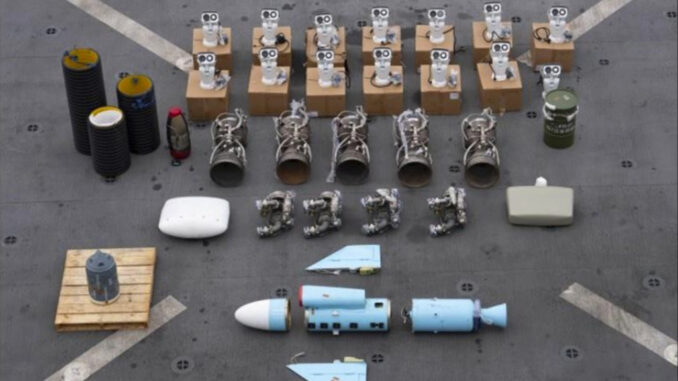
The Biden administration is expected to soon announce plans to redesignate Iranian-backed Houthi rebels in Yemen as specially designated global terrorists, according to two people familiar with the White House decision and a U.S. official.
The move comes as the Houthis have launched dozens of attacks on commercial vessels in the Red Sea. The group says it has attacked the ships in response to Israel’s military operations in Gaza in the aftermath of Hamas’ Oct. 7 attack on Israel.
The three people familiar with the decision were not authorized to comment and requested anonymity to discuss the matter ahead of the expected formal announcement.
Secretary of State Antony Blinken delisted the Houthis as both foreign terrorist organizations and as specially designated global terrorists in February 2021 as the administration sought to make it easier to get humanitarian aid into Yemen.
The Trump administration designated the Houthis a Foreign Terrorist Organization over the objections of human rights and humanitarian aid groups.
The foreign terrorist designation barred Americans and people and organizations subject to U.S. jurisdiction from providing “material support” to the Houthis, which the groups said would result in an even greater humanitarian catastrophe than what was already happening in Yemen.
Shortly after the Biden administration took office, Blinken removed the designations in a step that was roundly criticized by conservative lawmakers and others but was intended to keep much-needed food, medicine and other aid flowing to Yemen.
The specially designated global terrorists label to be reimposed on the Houthis does not include sanctions for providing “material support” and it does not come with travel bans that are also imposed with the FTO label. Thus, it may not pose a substantial impediment to providing aid to Yemeni civilians.
The redesignation is not wholly unexpected. Asked during an exchange with reporters last week if he thought the Houthis are a terrorist group, President Joe Biden responded, “I think they are.”
Meanwhile, a senior White House official said Tuesday that addressing the ongoing threat by Yemen’s Houthi rebels on commercial vessels in the Red Sea is an “all hands on deck” problem that the U.S. and allies must address together to minimize impact on the global economy.
“How long this goes on and how bad it gets comes down not just to the decisions of the countries in the coalition that took strikes last week,” White House national security adviser Jake Sullivan said during an appearance at the World Economic Forum in Davos, Switzerland.
The Iran-backed Houthi group has launched dozens of attacks since November on vessels in the Red Sea, a vital corridor for the world’s shipping traffic, in what they say is an effort to support Palestinians in the war with Israel. U.S. and British forces have responded by carrying out dozens of air and sea strikes on Houthi targets in Yemen since Friday. The attacks by the Houthis have continued.
Linda Thomas Greenfield, the U.S. ambassador to the United Nations, said last week that 2,000 ships since November have been forced to divert thousands of miles to avoid the Red Sea. Houthi militants have threatened or taken hostage mariners from more than 20 countries.
The Biden administration resisted striking back for weeks before U.S. and U.K. warships and aircraft launched waves of missiles at the Houthis in Yemen early last Friday.
The Red Sea attacks have already caused significant disruptions to global trade. Oil prices have edged higher in recent days, though Brent crude futures were down slightly in early trading Tuesday.
The U.S. launched a new strike against the Houthis on Tuesday, hitting anti-ship missiles in the third assault on the Iranian-backed group in recent days. The strike came as the Iranian-backed Houthis claimed responsibility for a missile attack against the Malta-flagged bulk carrier Zografia in the Red Sea. No one was injured.
Sullivan said it was critical that countries with influence on Tehran and other Middle East capitals make it clear “that the entire world rejects wholesale the idea that a group like the Houthis can basically hijack the world.”
Iran fired missiles late Monday at what it said were Israeli “spy headquarters” in an upscale neighborhood near the sprawling U.S. Consulate compound in Irbil, the seat of Iraq’s northern semi-autonomous Kurdish region, and at targets linked to the extremist Islamic State group in northern Syria.
Iraq on Tuesday called the attacks, which killed several civilians, a “blatant violation” of Iraq’s sovereignty and recalled its ambassador from Tehran.

